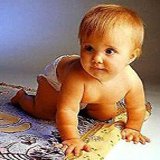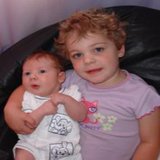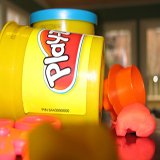Stimulating Child Social Development - 25 Month Old to 30 Month Old
Child social development advances as your child becomes more able to get on with other children. She is keen to play with her friends and they interact together more effectively. During the 25 month old development to 30 month old development my daughter was more caring towards another child who seemed upset.
However, together with her increasing independence, you may also find that she becomes anxious about situations with which she previously dealt confidently. This is all part of social and emotional development in children.
Child Social Development
25 - 30 month old
Suitable suggestions for Child Social Development
(25 Month Old - 30 Month Old)
Childhood Separation Anxiety
Separation anxiety in children may increase when temporarily separated from you during this child social development phase. For instance, when you go out and leave her in the care of a babysitter or relative.
It's surprising to see her become tearful at the prospect of parting from you for a short time - especially when you did not see this behavior from her when she was younger. This new toddler separation anxiety may be because she is so attached to you and now has the imagination to worry about coping without you.
If your child becomes tearful when she realizes you are off somewhere without her, try to calm her at the moment when you depart. Making fun of her for what appears to be immature behavior only makes matters worse.
Instead, give her a firm cuddle, tell her that you will be back soon and that you will listen about all the games she played while you were away. Then - leave whether or not she cries.
Lingering with your child until she settles completely might actually make the situation more stressful for her - a brief affectionate separation will be more likely building self confidence in the long run.
Social Skill Training
During this childhood social development phase, she is better at sharing but still finds this social skill hard to put into practice. While she happily takes sweets and toys from her friend, the chances are that she clings tightly to her own possessions. She may not grasp at this stage, that sharing should be reciprocal!
Talk to her about this and encourage her to share under your supervision. For instance, watch as she shares some sweets with her brother and sister or friends. Eventually, this kind of social skill training will pay off.
Dressing and Undressing
If she isn't already assisting with dressing and undressing, now is a good time to get her interested in this activity. It really doesn't matter how much she does - whether she tries to put on her vest and pants by herself or barely pulls her socks off her feet - just as long as she shares the responsibility for this activity. Don't do everything for her simply because it's easier and quicker for you!
Be sure to visit all the child social development pages for different ages.
Read more about the different stages of social development.
Top Tips for Child Social Development
(25 Month Old - 30 Month Old)
- Help her achieve success
- Have loving physical contact with her
- Comment on her strengths, not her weaknesses
- Listen when she talks
- Discourage rude behavior
Success will boost her confidence. Guide her when she tries to complete a puzzle toy or when she does something to increase her independence - she loves the taste of success and it will spur her to continue with that activity.
She's not too old to enjoy a loving, warm cuddle while you read a story to her. Close contact makes the activity much more enjoyable for both of you.
Your child is likely to feel sorry for herself when she can't achieve her goal. When she is feeling negative, tell her the reasons why you think she's fabulous. You won't "spoil" her with praise.
Once she has finished playing with other children her own age, she will want to tell you all about what happened. Listen attentively to her observations, nodding and frowning in all the right places.
Your child might not know that it's rude to push to the front of a queue or to point at a spot on someone's face. She depends on you to teach her "soft manners" at this age.
Top Toys for a 25 Month Old - 30 Month Old
- sand and water trays
- modeling clay
- crayons and paper
- soft ball
- toy car
Be sure to browse through all the child social development pages that is broken down in different age groups.
Find It!
Can't remember where you read something specific? Just type in your search term in the box below and your specific topic will be returned to you instantly.









